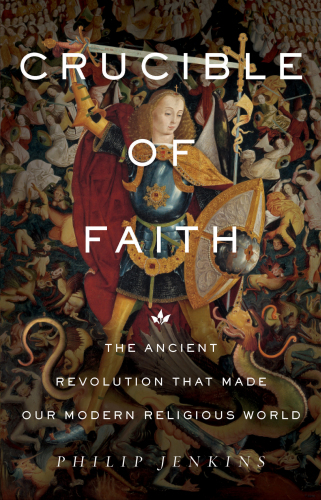
Crucible of Faith
The Ancient Revolution That Made Our Modern Religious World
کتاب های مرتبط
- اطلاعات
- نقد و بررسی
- دیدگاه کاربران
نقد و بررسی

July 10, 2017
In this absorbing and accessible account, Jenkins (The Many Faces of Christ), professor of history at the Institute for Studies of Religion at Baylor University, examines monotheism in 250–50 B.C.E., a time when political, philosophical, and spiritual cross-currents came together to give birth to the modern religious West. Jenkins argues that the spiritual revolution of this period established the cosmology and core scriptures of the Abrahamic religions: Judaism, and later Christian and Islamic traditions. Jenkins begins with a chapter that sets the stage for the Jewish diaspora’s encounters with the Greek empire and the cultures of Mesopotamia. Subsequent chapters draw on canonical, deuterocanonical, apocryphal, and Qu’ran writings to reconstruct how religious beliefs commonplace to us today were created in the centuries before the fall of the Second Temple in 70 C.E. Throughout, this work places critical spiritual debates within the context of warring empires, struggles over political and religious authority, and the daily experiences of living through tumultuous times. Like the writings of historian Karen Armstrong (A History of God), the book invites readers with a nonspecialist background to consider the historical roots of religious ideas and practices that many take for granted as eternal truths. Agent: Adam Eaglin, Cheney Associates.

July 1, 2017
In his latest work, Jenkins (history, Baylor Univ.; The Many Faces of Christ) tackles the "intertestamental period" or "Crucible Era" between the closure of the canonical Old Testament texts and before the birth of Jesus described in the New Testament. Jenkins argues that much of what transpired in this tumultuous 200-300--year period had great influence on the development of Judaism, Christianity, and, to some extent, Islam. The crucible era saw the spread of Greek influence and intellectual ideas, which separated the material and spiritual realities, elevating the spiritual over the material. This Hellenic influence forced Jews to reconsider and justify fundamental aspects of their religion, such as the creation story, in which God created both the greater spirit of man as well as the lesser, defective material world of mankind. This era also saw the birth of new ideas about the afterlife, the end times, the messiah, God and Satan, and angels and demons; all of which played into the rise of Christianity and later influenced Islamic beliefs. VERDICT Clearly well-researched and well-argued, this book will be of interest to readers who enjoy ancient history, religious history, and Judeo-Christian religion.--Crystal Goldman, Univ. of California, San Diego Lib.
Copyright 2017 Library Journal, LLC Used with permission.

August 1, 2017
An exploration of an underrated era and its effect on religious history."The two or three centuries before Jesus's time witnessed an extraordinary cultural and religious revolution," writes Jenkins (History/Institute for Studies of Religion, Baylor Univ.; The Many Faces of Christ: The Thousand-Year Story of the Survival and Influence of the Lost Gospels, 2015, etc.), "but that transformation is still barely acknowledged in historical writing, still less in popular perceptions." The author dubs this time period the "Crucible era" and valiantly attempts to undo that lack of academic and popular acknowledgement. Without this important era in Jewish and Hellenic history, argues Jenkins, the Abrahamic religions as we know them today would not exist, and all of history for the past two millennia would have been vastly different. The two to three centuries before the birth of Jesus were drastically violent and unsettled for the people of Palestine and nearby areas, as Greek influences overwhelmed the region, meeting with local resistance and, eventually, subsiding due to Roman expansion. However, historical writings about this era have either been relegated to the Apocrypha or were in many cases lost for centuries, making for scant awareness of this era's importance. Jenkins provides necessary historical context before examining both the political/military and the literary/scriptural legacies of the times. He recounts the power of the Greek Empire over the Jewish people and the subsequent rise in resentment at corrupt puppet leaders such as Jason, high priest from 175 to 172 B.C.E., who rose to power through pure corruption. Alongside histories of the crucible era's politics, Jenkins discusses the literary monuments they spawned. Chief among these were 1 Enoch, a fascinating work, which, Jenkins suggests, invented the concept of a burning hell as we know it; and the better known book of Daniel, the archetype of apocalyptic literature. A well-written, intriguing account of the centuries that set the stage for modern Judaism, the Christianity taught by Paul, and, eventually, Islam as an heir to both.
COPYRIGHT(2017) Kirkus Reviews, ALL RIGHTS RESERVED.

























دیدگاه کاربران